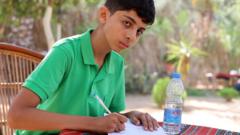In the heart of the relentless Gaza conflict, children are finding ways to survive amid unimaginable circumstances. An impactful new documentary, "Gaza: How to Survive a Warzone," sheds light on the experiences of some of these children, showcasing their courage and adaptability.
The film, co-directed by Yousef Hammash and Jamie Roberts, follows the lives of several young individuals, including an 11-year-old boy named Zakaria. Currently residing at the al-Aqsa hospital, Zakaria has become an unwavering presence within its walls, volunteering his time to assist the paramedics. Amid the chaos of ongoing emergency responses, he manages to clear pathways for arriving victims, embodying a level of resilience and responsibility far beyond his years.
Zakaria's perspective is haunting; he estimates that since the start of the war, he has witnessed the aftermath of thousands of bodies, recalling a particularly traumatic incident where he witnessed a young boy perish in flames during an Israeli strike. These experiences contrast sharply with what childhood typically entails—school, play, and exploration—and instead, Zakaria navigates trauma and sorrow, having already lost several friends to the ravages of war.
The documentary taps into their narratives through various video sources, as international journalists still face restrictions on entering Gaza. With the support of local cameramen, the film delves into the daily struggles of these children who strive to maintain some semblance of a normal life amidst chaos.
Among those featured is 13-year-old Abdullah, who previously studied at a British school in Gaza. He strives to continue his education despite the circumstances around him, narrating the film in excellent English. Meanwhile, 10-year-old Renad uses TikTok to connect with a world beyond the conflict, producing cooking shows with her sister, where they prepare dishes despite limited ingredients, amassing a following of over a million.
Rana, a 24-year-old and mother of a preterm baby, has faced displacement multiple times. Living near the hospital with her family, she represents the other side of this harsh reality faced by many Gazans, displaying strength and hopes amid adversity.
Though they live in designated "humanitarian zones," the situation remains dire with consistent strikes reported in these areas. The documentary illuminates the tireless efforts of medical professionals at al-Aqsa hospital, the last functioning hospital in central Gaza, where Zakaria passionately assists with emergency calls, clean-up efforts, and equipment handling, despite not being a trained medic.
Throughout the documentary, cycles of trauma, survival, and fleeting joy are explored as Zakaria expresses a desire to live a normal childhood while aspiring to be a paramedic one day. With moments of levity captured, including shared meals and trips to the beach with a paramedic named Said, viewers also see the remaining glimmers of childhood in the midst of despair.
The haunting realities of war and their profound impact on the youngest members of society is a strong theme in "Gaza: How to Survive a Warzone," providing viewers an unfiltered peek into both suffering and resilience as life in Gaza continues.
Watch "Gaza: How to Survive a Warzone" on BBC Two and iPlayer on February 17 at 21:00 (UK-only).


















